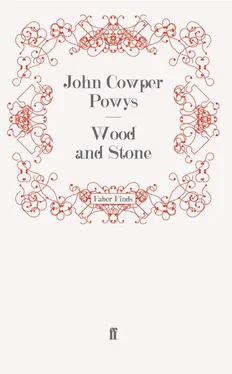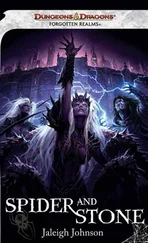Having replaced his cup and flask in his pocket, the master of the World-Show looked anxiously at the omens of the weather, snuffing the morning breeze with the air of one not lightly to be fooled either by rain or shine. Returning to the still silent circus, he knocked sharply with his knuckles at the door of the smallest of the three caravans.
“Flick!” he shouted, “let me in! Flick! Old Flick! Darn ’ee, man, for a blighting sand-louse! Open the door, God curse you! Old Flick! Old Flick! Old Flick!”
Thus assaulted, the door of the caravan was opened from within, and Mr. Love pushed his way into the interior. A strange enough sight met him when once inside.
The individual apostrophized as “Old Flick?” closed and bolted the door with extraordinary precaution, as soon as his master had entered, and then turned and hovered nervously before him, while Mr. Love sank down on the only chair in the place. The caravan was bare of all furniture except a rough cooking-stove and a three-legged deal table. But it was at neither of these objects that Job Love stared, as he tilted back his chair and waved impatiently aside the deprecatory old man.
Stretched on a ragged horse-blanket upon the floor lay a sleeping child. Clothed in little else than a linen bodice and a short flannel petticoat, she turned restlessly in her slumber under Mr. Love’s scrutiny, and crossing one bare leg over the other, flung out a long white arm, while her dark curls, disturbed by her movement, fell over her face and hid it from view.
“Ah!” remarked Mr. Love. “Quieter now, I see. She must dance today, Flick, and no mistake about it! You must take her out in the fields this morning, like you did that other one. I can’t have no more rampaging and such-like, in my decent circus. But she must dance, there’s no getting over that, — she must dance, Old Flick! ’Twas your own blighting notion to take her on, remember; and I can’t have no do-nothing foreigners hanging around, specially now August be come.
“What did she say her nonsense-name was? Lores, — Dolores? Whoever heard tell of such a name as that?”
The sound of his voice seemed to reach the child even in her sleep; for flinging her arms over her head, and turning on her back, she uttered a low indistinguishable murmur. Her eyes, however, remained closed, the dark curves of her long eye-lashes contrasting with the scarlet of her mouth and the ivory pallor of her skin.
Even Job Love — though not precisely an æsthete — was struck by the girl’s beauty.
“She’ll make a fine dancer, Flick, a fine dancer! How old dost think she be?’ Bout twelve, or may-be more, I reckon.
“’Tis pity she won’t speak no Christian word.’ Tis wonderful, how these foreign childer do hold so obstinate by their darned fancy-tongue!
“We must trim her out in them spangle-gauzes of Skipsy Jane. She were the sort of girl to make the boys holler. But this one’ll do well enough, I reckon, if so be she goes smilin’ and chaffin’ upon the boards.
“But no more of that devil’s foolery, Flick? Dost hear, man? Take her out into the fields;—take her out into the fields! She must dance and she must smile, all in Skipsy Jane’s spangles, come noon this day. She must do so, Flick — or I ain’t Jobie Love!”
The old man paused in his vague moth-like hovering, and surveyed the outstretched figure. His own appearance was curious enough to excite a thrill of intense curiosity, had any less callous eye but that of his master been cast upon him.
He produced the effect not so much of a living person, animated by natural impulses, as of a dead body possessed by some sort of wandering spirit which made use of him for its own purposes.
If by chance this spirit were to desert him, one felt that what would be left of Old Flick would be nothing but the mask of a man, — a husk, a shard, a withered stalk, a wisp of dried-up grass! The old creature was as thin as a lathe; and his cavernous, colourless eyes and drooping jaw looked, in that indistinct light, as vague and shadowy as though they belonged to some phantasmal mirage of mist and rain drifted in from the sleeping fields.
“How did ’ee ever get Mother Sterner to let ’ee have so dainty a bit of goods?” went on Mr. Love, continuing his survey of their unconscious captive.
“The old woman must have been blind-scared of the police or summat, so as to want to be free of the maid. ’Tisn’t every day you can pick up a lass so cut out for the boards as she be.”
At intervals during his master’s discourse the parchment-like visage of the old man twisted and contorted itself, as if with the difficulty of finding words.
When Job Love at last became silent, the words issued from him as if they had been rustling eddies of chaff, blown through dried stalks.
“I’ve tried her with one thing, Mister, and I’ve tried her with another, — but ’tis no use; she do cry and cry, and there’s no handling her. I guess I must take her into them fields, as you do say. ’Tis because of folks hearing that she do carry on so.”
Job Love frowned and scratched his forehead.
“Damn her,” he cried, “for a limpsy cat! Well — Old Flick — ye picked her up and ye must start her off. This show don’t begin till nigh along noon, — so if ye thinks ye can bring her to reason, some ways or ’tother ways, off with ’ee, my man! Get her a bite of breakfast first, — and good luck to ’ee! Only don’t let’s have no fuss, and don’t let’s have no onlookers. I’m not the man to stand for any law-breaking. This show’s a decent show, and Job Love’s a decent man. If the wench makes trouble, ye must take her back where she did come from. Mother Sterner’ll have to slide down. I can’t have no quarrels with King and Country, over a limpsy maid like she!”
Uttering these words in a tone of formidable finality, Mr. Love moved to the entrance and let himself out.
Their master gone, Old Flick turned waveringly to the figure on the floor. Taking down a faded coat from its peg on the wall, he carefully spread it over the child, tucking it round her body with shaking hands. He then went to the stove in the corner, lit it, and arranged the kettle. From the stove he turned to the three-legged table; and removing from a hanging cupboard a tea-pot, some cups and plates, a loaf of bread and a pat of butter, he set out these objects with meticulous nicety, avoiding the least clatter or sound. This done, he sat down upon the solitary chair, and waited the boiling of the water with inscrutable passivity.
From outside the caravan came the shuffle of stirring feet and the murmur of subdued and drowsy voices. The camp was beginning to enter upon its labour of preparation.
When he had made tea, Old Flick touched his sleeping captive lightly on the shoulder.
The girl started violently, and sat up, with wide-open eyes. She began talking hurriedly, protesting and imploring; but not a word of her speech was intelligible to Old Flick, for the simple reason that it was Italian, — Italian of the Neapolitan inflexion.
The old man handed her a strong cup of tea, together with a large slice of bread-and-butter, uttering as he did so all manner of soothing and reassuring words. When she had finished her breakfast he brought her water and soap.
“Tidy thee-self up, my pretty,” he said. “We be goin’ out, along into them fields, present.”
Bolting the caravan door on the outside, he shuffled off to the fountain to perform his own ablutions, and to assist his companions in unloading the stage-properties, and setting up the booths and swings. After the lapse of an hour he climbed the caravan-steps and re-entered softly.
He found the girl crouched in a corner, her hands clasped over her knees, and traces of tears upon her cheeks. Before leaving her, the old man had placed shoes and stockings by her side, and these she now wore, together with a dark-coloured skirt and a scarlet gipsy-shawl.
Читать дальше












